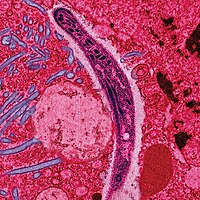
Photo from wikipedia
Feline calicivirus (FCV) is a common pathogen in domestic cats that is highly contagious, resistant to many disinfectants and demonstrates a high genetic variability. FCV infection can lead to serious… Click to show full abstract
Feline calicivirus (FCV) is a common pathogen in domestic cats that is highly contagious, resistant to many disinfectants and demonstrates a high genetic variability. FCV infection can lead to serious or even fatal diseases. In this review, the European Advisory Board on Cat Diseases (ABCD), a scientifically independent board of experts in feline medicine from 11 European countries, presents the current knowledge of FCV infection and fills gaps with expert opinions. FCV infections are particularly problematic in multicat environments. FCV-infected cats often show painful erosions in the mouth and mild upper respiratory disease and, particularly in kittens, even fatal pneumonia. However, infection can be associated with chronic gingivostomatitis. Rarely, highly virulent FCV variants can induce severe systemic disease with epizootic spread and high mortality. FCV can best be detected by reverse-transcriptase PCR. However, a negative result does not rule out FCV infection and healthy cats can test positive. All cats should be vaccinated against FCV (core vaccine); however, vaccination protects cats from disease but not from infection. Considering the high variability of FCV, changing to different vaccine strain(s) may be of benefit if disease occurs in fully vaccinated cats. Infection-induced immunity is not life-long and does not protect against all strains; therefore, vaccination of cats that have recovered from caliciviral disease is recommended.
Journal Title: Viruses
Year Published: 2022
Link to full text (if available)
Share on Social Media: Sign Up to like & get
recommendations!